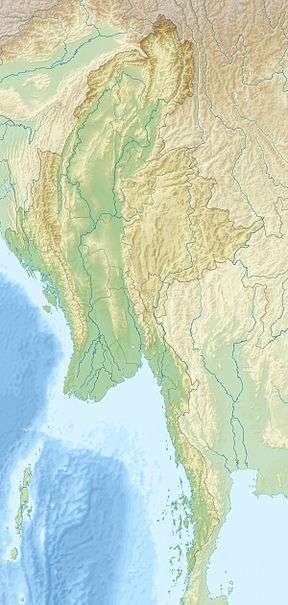Kyaikhtiyo Wildlife Sanctuary
Kyaikhtiyo Wildlife Sanctuary is a protected area in Myanmar stretching over 156.21 km2 (60.31 sq mi).[1] It covers evergreen and mixed deciduous forests an elevation of 50–1,090 m (160–3,580 ft) in Kyaikto Township. It was established in 2001 to conserve the biodiversity around the Kyaiktiyo Pagoda, a famous pilgrimage site in Mon State.[2]
| Kyaikhtiyo Wildlife Sanctuary | |
|---|---|
IUCN category III (natural monument or feature) | |
 Location in Myanmar | |
| Location | Kyaikto Township, Mon State, Myanmar |
| Nearest city | Kyaikhto |
| Coordinates | 17°28′00″N 97°05′00″E |
| Area | 156.21 km2 (60.31 sq mi)[1] |
| Established | 2001 |
| Visitors | 1000000 (in 2014) |
| Governing body | Myanmar Forest Department |
It is managed by the Nature and Wildlife Conservation Division.[3]
Biodiversity
The Indo-Pacific gecko (Hemidactylus garnotii) occurs in the sanctuary.[4] In 2001, the bent-toed gecko Cyrtodactylus aequalis was discovered in the sanctuary and described as a new species in 2003.[5]
Key wildlife species are leopard (Panthera pardus), serow (Capricornis milneedwardsiiare), red goral (Naemorhedus baileyi).[2] Sambar deer (Rusa unicolor), Indian muntjac (Muntiacus muntjak), gaur (Bos gaurus), wild boar (Sus scrofa) are also said to occur in the sanctuary.[6]
Threats
Kyaikhtiyo Wildlife Sanctuary is threatened by illegal logging, harvesting of fire wood and hunting of wildlife for subsistence.[2]
References
- World Database on Protected Areas (2019). "Kyeikhtiyoe Wildlife Sanctuary". Protected Planet.
- Beffasti, L.; Gallanti, V., eds. (2011). "Kyaikhtiyo". Myanmar Protected Areas: Context, Current Status and Challenges (PDF). Milano, Yangon: Istituto Oikos, Biodiversity and Nature Conservation Association. pp. 46–47.
- Lazarus, K. M.; Cardinale, P.; Corbett, M.; Lin, N. S.; Noeske, T. K. H. (2017). "Baseline Assessment Report of Terrestrial Biodiversity" (PDF). Strategic Environmental Assessment of the Hydropower Sector in Myanmar. Washington, D.C.: International Finance Corporation.CS1 maint: multiple names: authors list (link)
- Zug, G. R.; Vindum, J. V.; Koo, M. S. (2007). "Burmese Hemidactylus (Reptilia, Squamata, Gekkonidae): taxonomic notes on tropical Asian Hemidactylus" (PDF). Proceedings of the California Academy of Sciences. 58 (19): 387–405.
- Bauer, A. M. (2003). "Descriptions of seven new Cyrtodactylus (Squamata: Gekkonidae) with a key to the species of Myanmar (Burma)" (PDF). Proceedings of the California Academy of Sciences. 54 (25): 463–498.
- Johnson, S.; Bowman, V.; Makusheva, I. & Wachenfeld, M. (2018). Biodiversity in Myanmar, including Protected Areas and Key Biodiversity Areas. Supplement to Briefing Paper on Biodiversity, Human Rights and Business (PDF). Yangon, Myanmar: Myanmar Centre for Responsible Business.CS1 maint: multiple names: authors list (link)